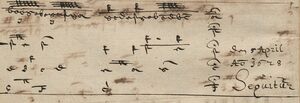M. W. C. B. M.: Difference between revisions
Jump to navigation
Jump to search
Fiskfan1999 (talk | contribs) |
Fiskfan1999 (talk | contribs) remove uncited original research |
||
| Line 2: | Line 2: | ||
Two pieces in [[The Lynar Tablatures|D-B Mus. Ms. Lynar B 3]] are headed by the unsolved initials '''M. W. C. B. M.''' It has been theorized that this refers to the composer [[Wilhelm Karges]] by [[Max Seiffert]]{{Citation needed}}. | Two pieces in [[The Lynar Tablatures|D-B Mus. Ms. Lynar B 3]] are headed by the unsolved initials '''M. W. C. B. M.''' It has been theorized that this refers to the composer [[Wilhelm Karges]] by [[Max Seiffert]]{{Citation needed}}. | ||
== Works<ref>Mus. Ms. Lynar B 3, scanned by Staatsbibliothek, Berlin. [http://resolver.staatsbibliothek-berlin.de/SBB000066CC00000000] Accessed 17 July, 2023</ref> == | == Works<ref>Mus. Ms. Lynar B 3, scanned by Staatsbibliothek, Berlin. [http://resolver.staatsbibliothek-berlin.de/SBB000066CC00000000] Accessed 17 July, 2023</ref><ref name="b">{{RO2001|Karges, Wilhelm}}</ref> == | ||
[[File:Mwcbm o mensch end.jpg|thumb|The end of ''O Mensch, bewein dein Sünde groß'' | [[File:Mwcbm o mensch end.jpg|thumb|The end of ''O Mensch, bewein dein Sünde groß'']] | ||
{| class="wikitable" | {| class="wikitable" | ||
|+Works by M. W. C. B. M. | |+Works by M. W. C. B. M. | ||
| Line 25: | Line 21: | ||
== Notes == | == Notes == | ||
These works are listed in [[Repertorium Orgelmusik]] under [[Wilhelm Karges]]<ref> | These works are listed in [[Repertorium Orgelmusik]] under [[Wilhelm Karges]]<ref name="b"></ref>. | ||
==References== | ==References== | ||
Revision as of 22:03, 26 August 2023

Two pieces in D-B Mus. Ms. Lynar B 3 are headed by the unsolved initials M. W. C. B. M. It has been theorized that this refers to the composer Wilhelm Karges by Max Seiffert[Citation needed].
Works[1][2]

| Manuscript | Title | Notes |
|---|---|---|
| D-B Mus. Ms. Lynar B 3 No. 6 | Vater unser / in Himmell / reich. / MW.C.B.M. | 3 verses. Third verse ends with "verte [sic.]" |
| D-B Mus. Ms. Lynar B 3 No. 24 | O Mensch Be / weine deine / sünde gros auf. / 2 Clavier der Co / rahll gecollorirett / M. W. C. B. M. |
Notes
These works are listed in Repertorium Orgelmusik under Wilhelm Karges[2].
References
- ↑ Mus. Ms. Lynar B 3, scanned by Staatsbibliothek, Berlin. [1] Accessed 17 July, 2023
- ↑ 2.0 2.1 [Karges, Wilhelm in Repertorium Orgelmusik2001]